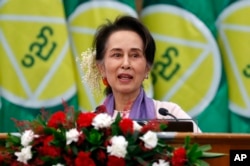A court in Argentina has issued an international arrest warrant for Senior General Min Aung Hlaing, the commander in chief of Myanmar’s military, for his role in the 2017 genocide against the Rohingya.
The court’s decision, announced Thursday, also lists two civilian leaders, including Aung San Suu Kyi, and 22 other military officials.
Min Aung Hlaing, who leads Myanmar’s military junta after seizing power in a 2021 coup, is at the center of the warrants issued by the court in Buenos Aires. The charges against him include aggravated murder, torture and sexual violence linked to the military’s brutal crackdown on the Rohingya population in Rakhine State, located in western Myanmar bordering with Bangladesh.
The Myanmar junta has yet to officially respond to the warrants from the Argentine court. However, in response to VOA’s inquiry, junta spokesperson General Zaw Min Tun dismissed Argentina’s legal authority over Myanmar.
“Does Argentina even know Myanmar? The Myanmar government knows Argentina. If Argentina wants to legally criticize Myanmar, it must have judicial authority in the country. I suggest you focus on filling your own vacant judicial positions first,” the spokesperson said in response to a VOA inquiry on the junta’s Viber press group.
Since the case was filed in 2019 under the principle of universal jurisdiction, the junta has consistently rejected Argentina’s involvement, maintaining that foreign courts have no authority to prosecute Myanmar’s leaders over the Rohingya issue. The principle of universal jurisdiction allows national courts to prosecute individuals for serious crimes that violate international law.
Legal efforts, court decision
The Burmese Rohingya Organisation U.K. (BROUK), which filed the initial complaint in 2019, praised the court’s ruling as a victory for justice.
“This is a victory for the Rohingya and for international justice,” said Tun Khin, president of BROUK, according to a Friday press statement. “It shows that no one is above the law, not even the military leaders who have committed genocide.”
In 2017, Myanmar’s army launched a brutal offensive against the Muslim Rohingya population in Rakhine State, which is located on the country’s western coast off the Bay of Bengal. The offensive followed attacks on police outposts by insurgent groups.
The military’s response involved mass killings, sexual violence and widespread destruction of villages, forcing more than 700,000 Rohingya to flee to neighboring Bangladesh. The United Nations and human rights organizations have described the military’s actions as a genocide.
Late last year, the International Criminal Court also issued an arrest warrant for Min Aung Hlaing for crimes against humanity.
While the warrant from Argentina for Min Aung Hlaing is a major development, the court’s decision on other leaders has sparked debate.
In December 2023, BROUK requested arrest warrants for military officials only, presenting evidence related to their roles in the genocide. No evidence was submitted for Aung San Suu Kyi, who served as state counselor and de facto leader of Myanmar during the 2017 military offensive against the Rohingya, or for former civilian President Htin Kyaw.
However, in June 2024, the Argentine prosecutor included them in his request. BROUK then asked the court to reconsider issuing warrants for these civilians, given Burma’s political context, but the court dismissed the request.
Aung San Suu Kyi has been imprisoned since the military took power in the 2021 coup.
Implications of warrant
Tomas Quintana, an Argentinian human rights lawyer and former U.N. special rapporteur for human rights in Myanmar and a key figure in the case, explained the court’s stance.
“We felt that at this stage in the investigation, it was not appropriate to seek arrest warrants for civilian leaders like Aung San Suu Kyi,” he told VOA’s Burmese Service in an exclusive interview. “But the court sided with the prosecutor, deciding to include civilians in the warrants.”
Quintana said the ruling was based on legal strategy and evidence available at the time.
Aung San Suu Kyi’s role in the genocide is still under investigation by the Argentine court. While the court initially focused on the direct perpetrators of the violence — the military leaders, including Min Aung Hlaing — it later sided with prosecutors to explore the civilian leaders’ responsibility as well.
“This decision marks a shift in international accountability,” Quintana said. “It is the first time Burma [Myanmar] has been held accountable in a court of law for crimes against the Rohingya.”
The investigation, which has spanned four years, was supported by survivor testimonies and documentation from the United Nations Independent Investigative Mechanism for Myanmar.
The Argentine court’s decision is expected to lead to an Interpol “red notice,” which would request the detention of Min Aung Hlaing and other Myanmar military leaders worldwide.
While the arrest warrant for Min Aung Hlaing is a significant step, Quintana said there are still challenges ahead.
“Myanmar’s military regime controls the country, so executing these warrants remains difficult,” he said. He called for international cooperation to ensure that officials were held accountable.
“The United Nations and the global community must work together to enforce these decisions.”
Despite the setback in including Aung San Suu Kyi in the arrest warrant, the warrants are a powerful symbolic ruling for the Rohingya people, Quintana said, adding that it is also a crucial step in the long process of justice.


